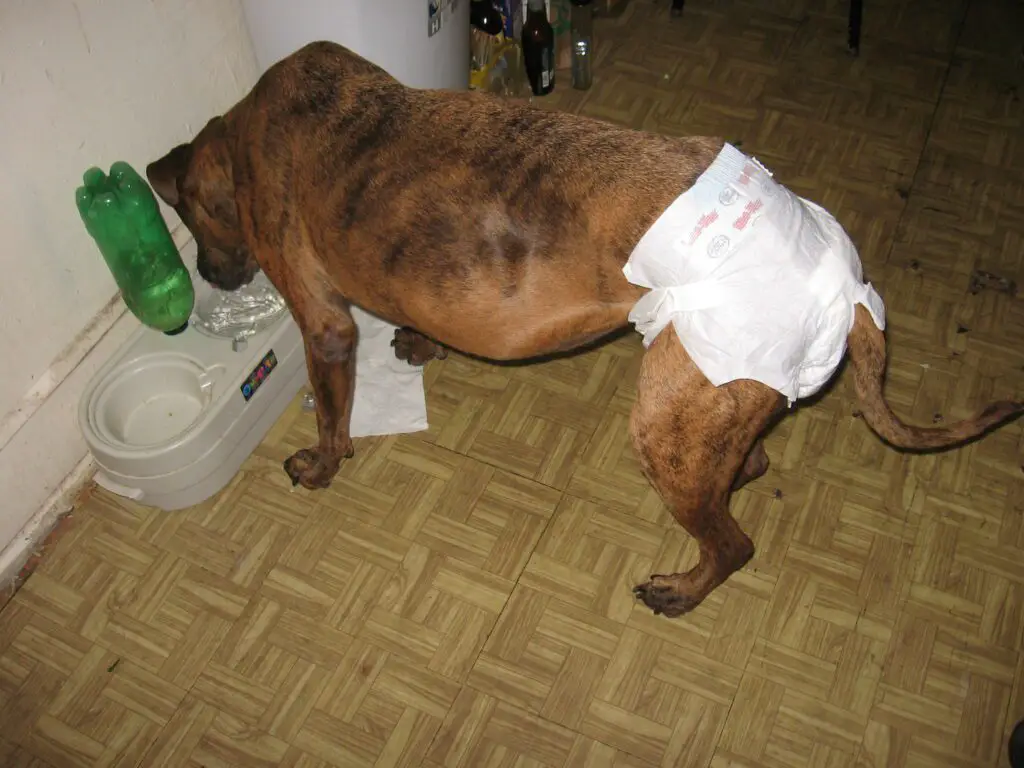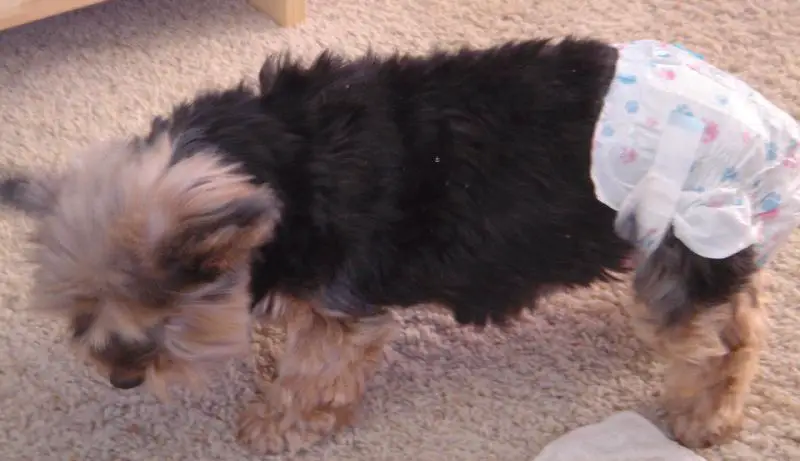Introducing your furry friend to diapers may not be something you’ve considered before, but for dogs recovering from neutering surgery, it can be a game changer.
In the aftermath of the procedure, pet parents are often concerned about their dog’s well-being and comfort. Can a dog wear a diaper after neutering? Absolutely!
In fact, using a diaper can help keep the surgical site clean, reduce the risk of infection, and prevent your pup from licking or scratching the area.
Read on to learn more about the benefits of using diapers post-neutering, and how to choose the right type and size for your four-legged companion.
Key Takeaway
| Key Takeaways | Details |
|---|---|
| Can a Dog Wear a Diaper After Neutering | Yes, using a diaper can help keep the surgical site clean, reduce the risk of infection, and prevent your pup from licking or scratching the area. |
| Choosing the Right Size Diaper | Measure your dog’s waist and weight, refer to the sizing chart provided by the manufacturer, consider the diaper style, and try it on your dog to ensure proper fit. |
| Safety for Male Dogs Wearing Diapers | It is generally safe for male dogs to wear diapers, but choose specially designed diapers like belly bands or male wraps, ensure proper fit, and change the diaper regularly. Monitor for skin irritation. |
| Bathroom Habits After Neutering | Dogs can use the bathroom normally after neutering, but there may be temporary changes due to pain, anesthesia, and activity restrictions. Monitor their habits and consult your veterinarian if needed. |
| Post-Neutering Care – What Not To Do | Avoid strenuous activities, bathing, removing the E-collar, excessive handling of the incision, giving medications without consulting a vet, and exposing your dog to hazardous environments. Monitor for signs of discomfort or pain. |
Can a Dog Wear a Diaper After Neutering

Yes, a dog can wear a diaper after neutering. In fact, using a diaper for your dog post-surgery can be quite beneficial.
Diapers help keep the surgical site clean, reducing the risk of infection and preventing your dog from licking or scratching the area, which can cause irritation and slow down the healing process.
To ensure your dog’s comfort and safety, it’s important to select the appropriate type and size of diaper and monitor your pet during the recovery period.
Always consult with your veterinarian if you have any concerns or questions about using diapers for your dog after neutering.
How To Choose The Right Size Diaper For a Neutered Dog

Choosing the right size diaper for your neutered dog is essential for their comfort and the effectiveness of the diaper.
Here are some steps to help you select the appropriate size:
- Measure your dog’s waist. Use a flexible measuring tape to measure the circumference of your dog’s waist, which is located just in front of its hind legs. Make sure the tape is snug but not too tight.
- Weigh your dog. Knowing your dog’s weight can be useful when selecting the appropriate diaper size, as most manufacturers provide weight recommendations for their products.
- Refer to the sizing chart. Check the diaper manufacturer’s sizing chart, which typically provides waist measurements and weight ranges for each size. Choose the size that corresponds to your dog’s measurements and weight.
- Consider the diaper style. There are different types of diapers available, such as disposable, reusable, and belly bands (for male dogs). Consider your dog’s needs and preferences when choosing the style.
- Try it on. Once you have purchased the diaper, try it on your dog to ensure it fits properly. It should be snug enough to prevent leaks but not too tight that it causes discomfort or restricts movement. Adjust the straps or fastenings as needed.
- Monitor your dog. Keep an eye on your dog while they wear the diaper, especially during the initial stages. Make sure they are comfortable and that the diaper stays in place. If you notice any signs of discomfort or irritation, consult your veterinarian and consider trying a different size or style.
Remember that every dog is unique, so it might take some trial and error to find the perfect fit. Always prioritize your dog’s comfort and well-being during the recovery process.
Is It Safe For Male Dogs To Wear Diapers?
Yes, it is generally safe for male dogs to wear diapers, but there are some important factors to consider. Male dogs require specially designed diapers, often called “belly bands” or “male wraps,” that cater to their anatomy and cover the genital area to prevent urine leakage.
The diaper should fit snugly around your dog’s waist without being too tight or too loose.
It’s crucial to change your dog’s diaper regularly to prevent urine buildup, which can lead to skin irritation and infection. Always keep your dog clean and dry to avoid health issues.
Be sure to monitor your dog’s skin for any signs of irritation, redness, or rashes, and consult your veterinarian if you notice any problems.
Diapers should be used as a temporary solution while addressing the underlying issue causing your dog to need them, such as incontinence, marking behavior, or medical conditions.
It’s essential to consult with your veterinarian to determine the best course of action for your dog’s specific needs.
How Do Dogs Use The Bathroom After Neuter?
After neutering, dogs will still be able to use the bathroom normally. However, there might be some temporary changes in their behavior and habits due to the surgery and the healing process.
Your dog may experience some pain and discomfort following the surgery, which can affect its ability to assume the normal position for urination or defecation. They might need some time to adjust and find a comfortable position.
The anesthesia used during the surgery may cause temporary changes in your dog’s bathroom habits, such as increased frequency or difficulty in controlling their bladder or bowels. These effects should subside as the anesthesia wears off, usually within 24-48 hours.
Your veterinarian will likely recommend that you restrict your dog’s physical activity for a period of time after the surgery to allow for proper healing. This might mean shorter, more controlled walks on a leash, which can impact their normal bathroom routine.
Your dog may need to wear an Elizabethan collar (E-collar) or a protective cone to prevent them from licking or biting the surgical area. This can make it more challenging for them to assume their usual position for using the bathroom.
It’s essential to closely monitor your dog’s bathroom habits after neutering and provide them with a comfortable, clean environment to relieve themselves.
If you notice any unusual behavior, difficulty urinating or defecating, or signs of infection around the surgical site, contact your veterinarian immediately. They can provide guidance and treatment to ensure a smooth recovery for your dog.
What Not To Do After Your Dog Gets Neutered?
After your dog gets neutered, it’s important to follow specific care guidelines to ensure a smooth and successful recovery.
Here are some things you should avoid doing:
- Do not allow your dog to engage in strenuous physical activities such as running, jumping, or playing with other dogs. This can cause strain on the surgical site and may lead to complications.
- Avoid bathing your dog or letting them swim until the incision has fully healed and your veterinarian has given the go-ahead. Getting the surgical site wet can increase the risk of infection.
- Do not remove the protective E-collar or cone unless instructed by your veterinarian. Dogs may instinctively lick or chew at the surgical site, which can cause irritation, infection, or even opening the incision.
- Resist the urge to examine the incision too frequently. While it’s essential to monitor the site for signs of infection, excessive handling can cause discomfort and slow down the healing process.
- Avoid giving your dog any medications or supplements without consulting your veterinarian first. Some medications can interfere with the recovery process or cause adverse reactions.
- Do not allow your dog to have access to stairs or slippery surfaces where they may accidentally injure themselves during the recovery period.
- Don’t ignore any signs of discomfort, pain, or unusual behavior from your dog. If you notice anything concerning, contact your veterinarian immediately.
By following your veterinarian’s post-operative care instructions and avoiding these actions, you’ll help ensure a successful recovery for your dog after its neutering procedure.
In Conclusion
In conclusion, using diapers for your dog after neutering is a practical and beneficial solution to ensure their comfort and proper healing.
By choosing the right type and size, you can prevent complications such as infections and minimize the chances of your pup irritating the surgical site.
As a responsible pet parent, it’s essential to monitor your dog during the recovery process and consult with your veterinarian if you have any concerns.
With proper care and the added support of diapers, your furry friend will be back to their playful self in no time!





Leave a Reply